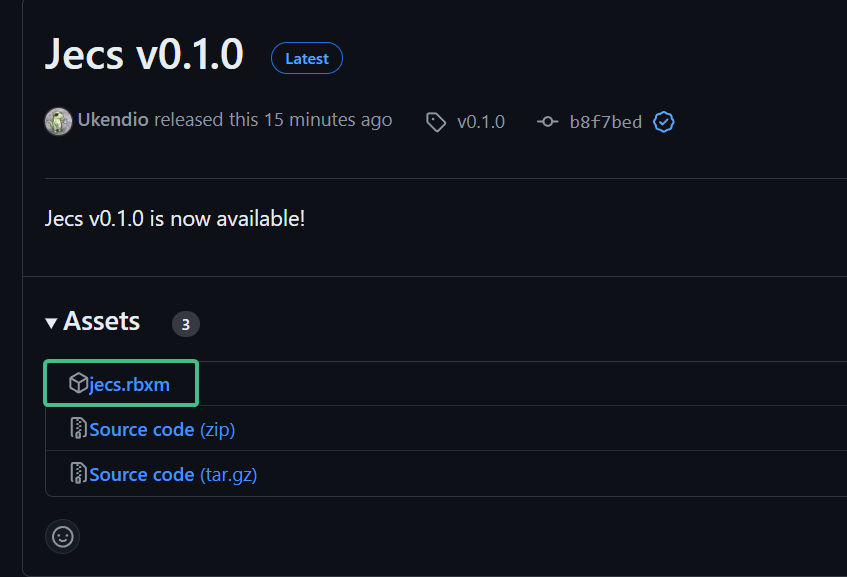mirror of
https://github.com/Ukendio/jecs.git
synced 2025-11-18 17:22:52 +00:00
4.2 KiB
4.2 KiB
Getting Started with Jecs
This guide will help you get Jecs up and running in your project.
Installation
Choose your preferred installation method:
Using Wally (Luau)
Add to your wally.toml: ::: code-group
[dependencies]
jecs = "ukendio/jecs@0.2.3"
:::
Then run:
wally install
Using npm (roblox-ts)
Use your preferred package manager: ::: code-group
npm i https://github.com/Ukendio/jecs.git
yarn add https://github.com/Ukendio/jecs.git
pnpm add https://github.com/Ukendio/jecs.git
:::
Standalone Installation
- Navigate to the releases page
- Download
jecs.rbxmfrom the assets - Import into your Roblox project
Basic Usage
Here's a simple example to get you started:
::: code-group
local jecs = require(path.to.jecs)
-- Create a world
local world = jecs.World.new()
-- Define components
local Position = world:component() :: jecs.Entity<Vector3>
local Velocity = world:component() :: jecs.Entity<Vector3>
-- Create an entity
local entity = world:entity()
-- Add components
world:set(entity, Position, Vector3.new(0, 0, 0))
world:set(entity, Velocity, Vector3.new(1, 0, 0))
-- Update system
local function updatePositions()
for id, position, velocity in world:query(Position, Velocity) do
world:set(id, Position, position + velocity)
end
end
import { World } from "@rbxts/jecs";
// Create a world
const world = new World();
// Define components
const Position = world.component<Vector3>();
const Velocity = world.component<Vector3>();
// Create an entity
const entity = world.entity();
// Add components
world.set(entity, Position, new Vector3(0, 0, 0));
world.set(entity, Velocity, new Vector3(1, 0, 0));
// Update system
function updatePositions() {
for (const [id, position, velocity] of world.query(Position, Velocity)) {
world.set(id, Position, position.add(velocity));
}
}
:::
Advanced Example: Relationships
Here's an example showing Jecs' relationship features:
::: code-group
local world = jecs.World.new()
local pair = jecs.pair
local Wildcard = jecs.Wildcard
-- Define components
local Name = world:component()
local Eats = world:component()
-- Create food types (components are entities!)
local Apples = world:component()
world:set(Apples, Name, "apples")
local Oranges = world:component()
world:set(Oranges, Name, "oranges")
-- Create entities with relationships
local bob = world:entity()
world:set(bob, Name, "bob")
world:set(bob, pair(Eats, Apples), 10)
world:set(bob, pair(Eats, Oranges), 5)
local alice = world:entity()
world:set(alice, Name, "alice")
world:set(alice, pair(Eats, Apples), 4)
-- Query relationships
for id, amount in world:query(pair(Eats, Wildcard)) do
local food = world:target(id, Eats)
print(string.format("%s eats %d %s",
world:get(id, Name),
amount,
world:get(food, Name)))
end
-- Output:
-- bob eats 10 apples
-- bob eats 5 oranges
-- alice eats 4 apples
:::
Key Features
Entity Management
-- Create entities
local entity = world:entity()
-- Delete entities
world:delete(entity)
-- Clear all components
world:clear(entity)
Component Operations
-- Add component (tag)
world:add(entity, IsEnemy)
-- Set component value
world:set(entity, Health, 100)
-- Get component value
local health = world:get(entity, Health)
-- Remove component
world:remove(entity, Health)
Relationships
-- Create parent-child relationship
world:add(child, pair(jecs.ChildOf, parent))
-- Query children
for child in world:query(pair(jecs.ChildOf, parent)) do
-- Process child entities
end
Next Steps
- Check out the First Jecs Project tutorial
- Learn about Entities and Components
- Explore Queries and Relationships
- Browse the API Reference
Getting Help
- Join our Discord server
- Check the FAQ
- Report issues on GitHub
